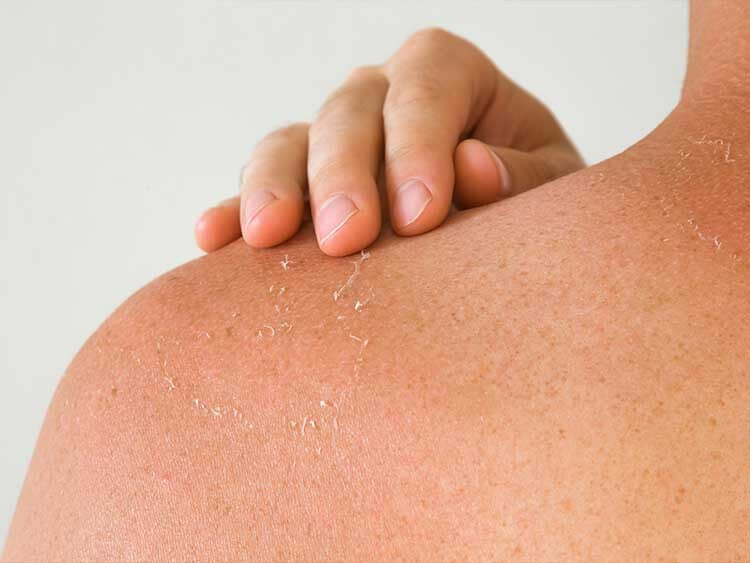The significance of diet in shaping skin health cannot be overstated. Hydration, healthy fats, antioxidants, vitamins and minerals, protein, and low-glycemic foods are all ways your diet can help you look your best. You can sculpt your skin's health from the inside out by feeding it a balanced diet rich in hydrating foods, healthy fats, antioxidants, vitamins, minerals, and protein. This will help it look and feel its best.
Unveiling the Science: How Nutrition Influences Skin
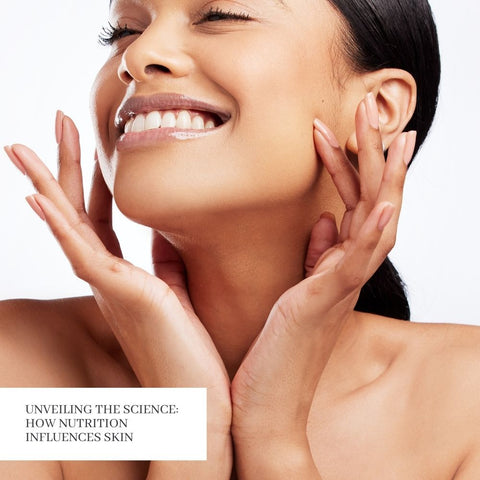
Understanding the science of how nutrition affects the skin is fascinating! Here's an overview of how various nutrients affect skin health, including hydration, antioxidants, omega-3 fatty acids, protein, vitamins and minerals, and the glycemic index. Prioritising a balanced diet rich in hydrating foods, antioxidants, healthy fats, protein, and essential vitamins and minerals will help your skin stay healthy, radiant, and youthful.
Vital Vitamins: The Building Blocks of Radiant Skin
Vitamins are essential for keeping your skin healthy and radiant. Here's an overview of some key vitamins and how they affect skin health:
-
Vitamin A: This vitamin is necessary for skin repair and maintenance. It promotes cell turnover and collagen production, thereby keeping the skin firm and healthy. Retinoids, which are vitamin A derivatives, are commonly used in skincare products to improve skin texture, reduce wrinkles, and even skin tone.
-
Vitamin C: As a powerful antioxidant, vitamin C protects the skin from free radical damage and environmental stressors such as UV radiation and pollution. It also plays an important role in collagen synthesis, which helps to keep the skin firm and youthful. Furthermore, vitamin C can brighten the skin and reduce dark spots or hyperpigmentation.
-
Vitamin E: Vitamin E, like vitamin C, is an antioxidant that protects the skin from oxidative damage. It also has anti-inflammatory properties that can relieve irritated or inflamed skin. Vitamin E is commonly used in moisturisers and serums to hydrate the skin and improve its texture.
-
Vitamin D: Vitamin D is best known for its role in bone health, but it also has an impact on skin health. It promotes cell growth and repair and may lower the risk of certain skin conditions such as acne and eczema.
-
Vitamin K: This vitamin is necessary for blood clotting, but it also benefits the skin. Vitamin K can reduce the appearance of dark circles under the eyes by strengthening the capillaries and increasing blood flow to the area.
-
B Vitamins: Niacinamide (vitamin B3), panthenol (vitamin B5), and biotin (vitamin B7) are all essential for skin health. Niacinamide, for example, can help to improve skin barrier function, reduce redness, and control oil production. Panthenol is extremely hydrating and can help soothe and soften the skin. Biotin is involved in the synthesis of fatty acids, which are required for healthy skin.
Antioxidants: Nature's Defense Against Aging
Antioxidants are nature's powerful anti-aging agents, and they are essential for skin health. Here's why: neutralising free radicals, protecting against UV damage, reducing inflammation, promoting collagen production, brightening the skin, and enhancing skin barrier function. Consuming antioxidant-rich foods like fruits, vegetables, nuts, seeds, and green tea can help support your skin's natural defence system and keep it looking young and radiant. Furthermore, using antioxidant-containing skincare products can provide additional protection against environmental damage while also improving overall skin health.
The Hydration Effect: Water's Role in Maintaining Skin Vitality
Water is essential for maintaining skin vitality and overall health. Here's how hydration impacts your skin:
- Moisture Balance: Proper hydration is essential for keeping the skin's moisture balance. When your body is properly hydrated, your skin retains more moisture, keeping it soft, supple, and hydrated. Dehydrated skin can appear dry, tight, and flaky, and it is more susceptible to irritation and premature ageing.
- Plumping Effect: Hydrated skin has a plumper appearance because water fills the spaces between skin cells. This can help to reduce the appearance of fine lines and wrinkles, making the skin appear smoother and more youthful.
- Improved Elasticity: Proper hydration helps the skin's elasticity, which allows it to stretch and bounce back into shape. This helps to maintain firmness and resilience, preventing sagging and drooping caused by ageing.
- Detoxification: Water is required to flush toxins and waste products from the body, including those that can cause skin problems such as acne and inflammation. Staying hydrated supports the body's natural detoxification processes, resulting in clearer, healthier-looking skin.
- Regulation of Oil Production: Dehydration can cause the skin to produce more oil as a compensatory mechanism, resulting in clogged pores and breakouts. Staying properly hydrated can help regulate oil production and prevent excess sebum production, lowering the risk of acne and breakouts.
- Enhanced Nutrient Delivery: Water is an essential component of the body's circulatory system, helping to transport nutrients and oxygen to skin cells. Proper hydration ensures that essential nutrients reach the skin, promoting health and vitality from the inside out.
Myth vs. Reality: Addressing Common Misconceptions About Diet and Skin
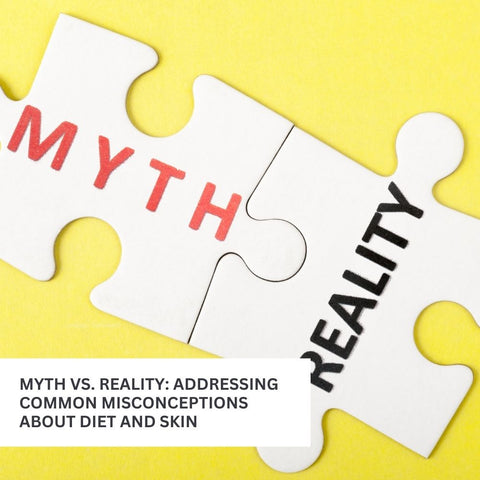
Let's debunk some common myths about diet and skin health:
-
Myth 1: Chocolate and greasy foods can cause acne.
Reality: While chocolate and greasy foods have traditionally been blamed for acne, there is little scientific evidence to back this up. Acne is mainly caused by genetics, hormones, and inflammation. While high-glycemic foods and dairy products may aggravate acne in some people, there is no direct link between chocolate or greasy foods and acne for the majority of people. -
Myth 2: Drinking plenty of water can cure dry skin.
Reality: While staying hydrated is beneficial to overall health and skin hydration, simply drinking plenty of water may not be sufficient to treat dry skin. Dry skin can be caused by harsh weather, hot showers, and the use of drying skincare products. To effectively treat dry skin, use moisturisers containing hydrating ingredients such as hyaluronic acid, glycerin, and ceramides, and stay hydrated. -
Myth 3: Tans protect your skin from sunburn.
Reality: A tan is an indication of sun damage, not sun protection. When you tan, your skin produces melanin in response to UV radiation to protect itself from further damage. However, this does not provide adequate protection against harmful UV rays, and prolonged sun exposure increases the risk of skin cancer, premature ageing, and other skin damage. -
Myth 4: Vitamin Supplements Can Replace A Healthy Diet For Skin Health.
Reality: While vitamin supplements can help people with deficiencies or specific medical conditions, they are not a replacement for a healthy, balanced diet. The best way to nourish your skin is to eat a variety of nutrient-dense foods, such as fruits, vegetables, whole grains, lean proteins, and healthy fats. Whole foods contain a diverse set of vitamins, minerals, antioxidants, and other nutrients that work together to promote skin health. -
Myth 5: Scrubbing your skin vigorously will remove blackheads and acne.
Reality: Scrubbing your skin vigorously can aggravate acne and cause irritation. Scrubbing vigorously can remove the skin's natural oils and disrupt its protective barrier, resulting in inflammation and breakouts. Instead, opt for gentle exfoliation with chemical exfoliants such as alpha hydroxy acids (AHAs) or beta hydroxy acids (BHAs), which can help unclog pores and remove dead skin cells without causing harm.
Debunking the Dairy Dilemma: Facts You Need to Know
Let's address the dairy dilemma and separate myth from reality:
-
Myth 1: Dairy Causes Acne
Reality: While some people may find that dairy exacerbates their acne, the relationship between dairy consumption and acne is complex and varies from person to person. Certain components in dairy products, such as hormones and growth factors, may contribute to increased oil production and inflammation, which can worsen acne in some individuals. However, scientific evidence linking dairy consumption directly to acne is inconclusive, and not everyone who consumes dairy will experience acne. -
Myth 2: All Dairy Products Have the Same Effect on Skin
Reality: Different dairy products may have varying effects on skin health. For example, high-glycemic dairy products like milk and ice cream, which have a high sugar content, may have a greater impact on acne compared to lower-glycemic dairy products like yogurt and cheese. Additionally, individual tolerance to dairy products can vary, and some people may be more sensitive to certain types of dairy than others. -
Myth 3: Cutting Out Dairy Will Automatically Improve Skin
Reality: While eliminating dairy from your diet may improve skin health for some individuals, it's not a guaranteed solution for everyone. Skin health is influenced by a variety of factors, including genetics, hormones, diet, skincare routine, and lifestyle habits. If you suspect that dairy is contributing to skin issues like acne, it may be worth experimenting with eliminating or reducing dairy consumption to see if it makes a difference. However, it's important to ensure that you're still getting essential nutrients from other sources if you choose to eliminate dairy from your diet. -
Myth 4: Dairy is Essential for Strong Bones and Overall Health
Reality: While dairy products are a rich source of calcium and vitamin D, which are important for bone health, they're not the only sources of these nutrients. Calcium can be found in many non-dairy foods such as leafy green vegetables, fortified plant-based milk, tofu, almonds, and sardines. Additionally, vitamin D can be obtained from sun exposure and fortified foods like fortified cereals and orange juice. A well-balanced diet that includes a variety of nutrient-rich foods can provide all the essential nutrients needed for strong bones and overall health, with or without dairy. -
Myth 5: Dairy Alternatives Are Always Healthier Than Dairy
Reality: While dairy alternatives like almond milk, soy milk, and coconut yogurt are popular choices for those who avoid dairy, not all dairy alternatives are created equal. Some dairy alternatives may be highly processed and contain added sugars, flavors, and preservatives. It's important to choose dairy alternatives that are unsweetened and fortified with nutrients like calcium and vitamin D. Additionally, some individuals may have allergies or intolerances to certain dairy alternatives, so it's important to choose options that work best for your individual needs.
By understanding the nuances of the dairy dilemma, you can make informed choices about your diet and its potential impact on your skin health. If you're unsure about how dairy affects your skin, consider consulting with a healthcare professional or a registered dietitian for personalized guidance.
Sugar and Skin: Separating Fact from Fiction
Let us define the relationship between sugar and skin health:
-
Fact 1: Sugar causes acne.
Fiction: While the relationship between sugar and acne is complex, high-glycemic foods—those that cause rapid spikes in blood sugar levels—have been linked to an increased risk of developing acne. High-glycemic foods include sugary snacks, processed foods, white bread, and sugary beverages. Consuming these foods can cause elevated insulin levels and increased sebum production, which may contribute to clogged pores and acne breakouts. However, it is important to note that not everyone will develop acne as a result of eating sugary foods, and other factors such as genetics, hormones, and skincare habits all play a role. -
Fact 2: Sugar causes premature ageing.
Fiction: Excess sugar consumption can cause premature ageing via a process known as glycation. Sugar molecules in your bloodstream can attach to proteins such as collagen and elastin, resulting in the formation of advanced glycation end products. AGEs can cause collagen and elastin breakdown, causing skin to lose firmness and elasticity and contributing to wrinkles and fine lines. While limiting sugar consumption may help reduce the formation of AGEs and slow the ageing process, other lifestyle factors such as sun exposure, smoking, and pollution all play important roles in premature ageing. -
Fact 3: All sugars have the same effect on the skin.
Fiction: Not all sugars have the same impact on skin health. While refined sugars found in processed foods and sugary snacks can cause acne and premature ageing, natural sugars found in whole foods such as fruits, vegetables, and dairy products are less likely to hurt skin health. Whole foods contain fibre, vitamins, minerals, and antioxidants, which can help counteract the negative effects of sugar and improve overall skin health. -
Fact 4: Eliminating sugar will improve skin.
Fiction: While reducing sugar intake can improve skin health for some people, eliminating sugar may not be necessary or practical for everyone. Sugar is naturally found in a variety of foods, including fruits, vegetables, and dairy products, all of which contain essential nutrients for overall health and skin health. Instead of eliminating sugar, aim to reduce your consumption of processed and refined sugars while maintaining a balanced diet rich in whole foods. -
Fact 5: Artificial sweeteners are better for the skin than sugar.
Fiction: While artificial sweeteners such as aspartame, saccharin, and sucralose have fewer calories than sugar and may be beneficial for those looking to reduce their calorie intake, there is little research on their specific effects on skin health. According to some studies, artificial sweeteners may hurt gut health and metabolism, which can then affect skin health. Furthermore, substituting artificial sweeteners for sugar in foods and beverages may not address the underlying issues associated with poor dietary choices, nor may it provide the same nutritional benefits as whole foods.
Can Your Diet Really Cause Acne? Exploring the Evidence
The relationship between diet and acne is a topic of ongoing research, and while the evidence is not conclusive, there are signs that certain dietary factors may influence acne development in some people. Here's an analysis of the evidence, including high-glycemic foods, dairy products, omega-6 fatty acids, the western diet, and low-glycemic diet. While these studies shed light on the potential link between diet and acne, it is important to note that individual responses to dietary factors can differ. Genetics, hormones, lifestyle habits, and skincare routines all play an important role in acne development. If you have acne and suspect that your diet is contributing to it, keep a food diary to track your symptoms and seek personalised advice from a healthcare professional or a registered dietitian.
Crafting Your Skin-Perfecting Diet: Practical Tips and Foods to Embrace
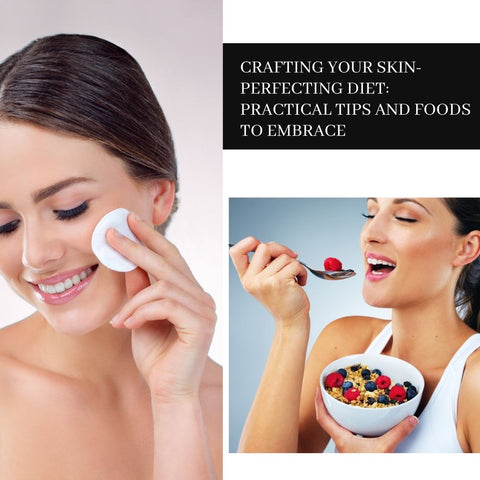
A skin-perfecting diet entails incorporating nutrient-dense foods that promote skin health while avoiding or limiting foods that may aggravate skin issues. Here are some useful tips and foods to try for healthier skin:
-
Fruits and vegetables are high in vitamins, minerals, antioxidants, and fibre, all of which are beneficial to skin health. Aim to include a variety of colourful fruits and vegetables in your diet to ensure you are getting enough nutrients. Berries, oranges, spinach, kale, carrots, and sweet potatoes are excellent for skin health.
-
Whole grains, such as oats, brown rice, quinoa, and whole wheat, contain fibre, vitamins, and minerals that promote overall health, including skin health. Avoid refined grains such as white bread, white rice and sugary cereals, as they can raise blood sugar levels and contribute to inflammation and acne.
-
Omega-3 fatty acids, found in fatty fish such as salmon, walnuts, flaxseeds, and chia seeds, are good for your skin. These fats support the skin's lipid barrier, keeping it hydrated and reducing inflammation. Include sources of monounsaturated fats such as avocados, olive oil, and nuts, which promote overall skin health.
-
Protein is necessary for the development and repair of tissues, including skin tissues. Choose lean proteins such as chicken, turkey, fish, tofu, beans, and lentils. These foods contain amino acids, which promote collagen production and help to keep the skin firm and elastic.
-
Drinking plenty of water is essential for keeping skin hydrated and flushing toxins from the body. Drink at least 8 glasses of water per day, and include hydrating foods like cucumbers, watermelon, and citrus fruits.
-
Sugary snacks, white bread, processed foods, and sugary drinks all have a high glycemic index, which can cause inflammation and acne. Reduce your consumption of these foods and replace them with healthier options such as whole fruits, nuts, and whole grains.
-
While the link between dairy and acne is still debated, some people may find that dairy worsens their acne. If you suspect that dairy is causing your skin problems, consider reducing your intake or switching to non-dairy alternatives such as almond milk, soy milk, or coconut yoghurt.
-
Eating large portions of any food, even healthy ones, can cause weight gain and worsen skin conditions like acne. Pay attention to serving sizes and your body's hunger and fullness cues to improve your portion control.
From Plate to Palette: Foods That Enhance Skin Glow
Creating a diet that boosts skin radiance entails including foods high in vitamins, minerals, antioxidants, and other nutrients that promote skin health. Here is a list of foods to eat for a radiant complexion:
-
Bright-Colored Fruits and Vegetables: Add a variety of colourful fruits and vegetables to your diet. Choose leafy greens like spinach and kale, colourful berries like strawberries and blueberries, and orange-colored produce like carrots, sweet potatoes, and oranges. These foods contain high levels of vitamins A, C, and E, as well as antioxidants such as beta-carotene and lycopene, which promote skin radiance and protect against free radical damage.
-
Omega-3 Rich Foods: Incorporate fatty fish like salmon, mackerel, and sardines into your diet, as well as plant-based sources of omega-3 fatty acids like walnuts, flaxseeds, and chia seeds. Omega-3 fatty acids support the skin's lipid barrier, keeping it hydrated and supple while reducing inflammation and promoting a healthy glow.
-
Nuts and Seeds: Snack on almonds, sunflower seeds, and pumpkin seeds, which are high in vitamin E, an antioxidant that protects the skin from oxidative damage and keeps it looking young. Additionally, nuts and seeds contain healthy fats that promote skin health and hydration.
-
Avocado: Add avocado to your meals for a source of healthy monounsaturated fats, vitamin E, and vitamin C. Avocado hydrates the skin from within, reduces inflammation, and promotes a radiant complexion. Eat avocado slices raw or blended into smoothies, salads, or toast.
-
Citrus Fruits: Vitamin C, which is necessary for collagen synthesis and skin repair, is abundant in citrus fruits like lemons, oranges, and grapefruits. Additionally, vitamin C possesses antioxidant qualities that help shield the skin from damage brought on by free radicals, leaving the complexion looking more radiant and brighter.
-
Green Tea: Replace your regular beverage with green tea, which contains antioxidants known as catechins. These antioxidants reduce inflammation, protect against UV damage, and improve skin elasticity, resulting in a healthier, more radiant complexion.
-
Dark Chocolate: Dark chocolate contains flavonoids, which can improve blood flow to the skin, protect it from sun damage, and keep it hydrated. To reap the most benefits, choose dark chocolate with at least 70% cocoa content.
-
Probiotic Foods: To support gut health, eat probiotic-rich foods such as yoghurt, kefir, sauerkraut, and kimchi. A healthy gut microbiome is beneficial to skin health because it reduces inflammation and promotes a balanced immune response, resulting in clearer and more radiant skin.
Probiotics and Gut Health: A Clear Skin Connection
The relationship between probiotics, gut health, and clear skin is a fascinating topic of study. Here's how it works: balanced gut microbiome, reduced inflammation, improved nutrient absorption, increased immune function, regulated hormones, stress reduction, and elimination of skin conditions. Probiotic-rich foods such as yoghurt, kefir, sauerkraut, kimchi, and kombucha can help with gut health and clear skin. You should also consider taking a high-quality probiotic supplement, particularly if you have specific skin or digestive issues. Eat a balanced diet high in fibre, fruits, vegetables, and whole grains to nourish your gut microbiome and improve overall skin health.
Omega-3s: The Fatty Acids That Fight Inflammation and Aging
Omega-3 fatty acids are essential nutrients that have a variety of health benefits, including inflammation and anti-aging. Here's how they operate:
-
Anti-Inflammatory Properties: Omega-3 fatty acids, particularly eicosapentaenoic acid (EPA) and docosahexaenoic acid (DHA), are effective anti-inflammatory agents. They compete with omega-6 fatty acids for incorporation into cell membranes, resulting in the production of less inflammatory compounds. By reducing inflammation in the body, omega-3s can help alleviate symptoms of inflammatory conditions like arthritis, inflammatory bowel disease, and skin issues.
-
Skin Health: Preventing premature ageing and preserving the health of the skin are major goals of omega-3 fatty acids. They keep the skin hydrated and stop moisture loss by supporting the lipid barrier of the skin. Omega-3s are also anti-inflammatory, which can help reduce skin inflammation, redness, and irritation. Furthermore, omega-3s may protect the skin from UV rays and stimulate collagen production, resulting in smoother, firmer, and more youthful-looking skin.
-
Heart Health: Omega-3 fatty acids are widely recognised for their cardiovascular benefits. They help to lower triglyceride levels, blood pressure, and plaque buildup in the arteries, lowering the risk of heart attack and stroke. Omega-3s promote heart health while also improving overall circulation, which is necessary for delivering nutrients and oxygen to the skin.
-
Brain Function: DHA, in particular, is beneficial to brain health and cognitive function. It is a major component of brain cell membranes and contributes to neurotransmitter signalling. Omega-3 fatty acids have been linked to better memory, concentration, and mood, and they may help lower the risk of age-related cognitive decline and neurodegenerative diseases such as Alzheimer's.
-
Eye Health: DHA is abundant in the retina of the eye and is essential for maintaining vision and eye health. Omega-3 fatty acids may help protect against age-related macular degeneration, a leading cause of vision loss in older adults, as well as dry eye syndrome.
Integrating Nutrition and Skincare: A Holistic Approach to Radiant Skin
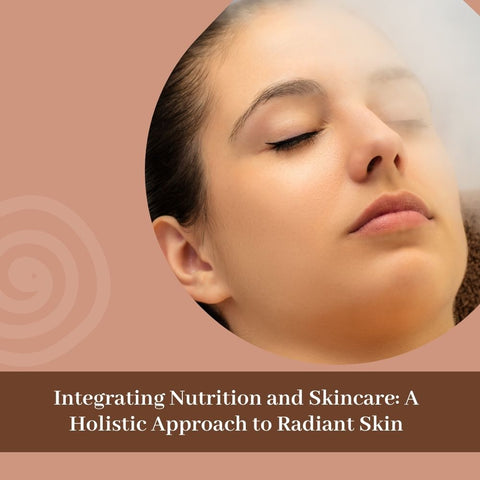
Integrating nutrition and skincare is a truly holistic approach to achieving radiant skin. Here's how you can combine both aspects to achieve optimal skin health:
-
Begin by nourishing your skin from within by eating fruits, vegetables, whole grains, lean proteins, and healthy fats. These nutrient-dense foods contain essential vitamins, minerals, antioxidants, and fatty acids, which promote skin health and a radiant complexion.
-
Drink plenty of water throughout the day to stay hydrated and help your skin retain moisture from within. Use hydrating skincare products, such as moisturisers and serums, to seal in moisture and keep your skin hydrated and plump.
-
To protect your skin from free radical damage, eat antioxidant-rich foods like berries, citrus fruits, leafy greens, and nuts. Use skincare products with antioxidants such as vitamin C, vitamin E, and green tea extract to protect against environmental stressors and promote healthy, glowing skin.
-
To promote skin health, consume a balanced diet rich in omega-3 and omega-6 fatty acids. While omega-3 fatty acids are anti-inflammatory and promote skin hydration, omega-6 fatty acids, when consumed in excess, can cause inflammation. To maintain a healthy balance, increase your intake of omega-3-rich foods such as fatty fish, flaxseeds, and walnuts.
-
Reduce your consumption of sugary and processed foods, which can lead to inflammation, oxidative stress, and skin problems such as acne and premature ageing. Choose whole, unprocessed foods that nourish your skin and promote overall health.
-
Wear sunscreen every day to protect your skin from harmful UV rays, which can cause premature ageing, sunburn, and skin cancer. Furthermore, eat foods high in antioxidants and polyphenols, such as tomatoes, carrots, and green tea, to help protect your skin from UV damage.
-
Get Adequate Sleep and Manage Stress: To improve skin health, prioritise quality sleep and use stress-reduction techniques such as meditation, yoga, or deep breathing. Chronic stress can exacerbate skin conditions such as acne, eczema, and psoriasis, so finding ways to relax and unwind is critical for maintaining healthy skin.
-
Consult a Professional: If you have specific skin concerns or conditions, speak with a dermatologist or registered dietitian for personalised advice and recommendations. They can assist you in creating a skincare routine and dietary plan that is tailored to your specific needs and goals.
Meal Planning for Maximum Skin Benefit: A Guide
Meal planning for maximum skin benefits entails choosing nutrient-dense foods that promote skin health and incorporating them into well-balanced meals. Here's a guide to help you plan meals that promote radiant skin: include a variety of colourful fruits and vegetables, incorporate lean proteins, choose whole grains, incorporate healthy fats, snack on nutrient-rich foods, stay hydrated, limit processed and sugary foods, and plan and prep. Following these meal planning tips and incorporating nutrient-rich foods into your diet will nourish your skin from the inside out, resulting in a radiant, healthy complexion. Remember to listen to your body's hunger and fullness cues and adjust your meal plan as needed to meet your specific needs and preferences.
Supplements vs. Whole Foods: What's Best for Skin Health?
When it comes to skin health, both supplements and whole foods play important roles, but there are some key differences to consider:
Whole Foods:
-
Whole foods provide a wide array of nutrients, including vitamins, minerals, antioxidants, and phytochemicals, in their natural form. These nutrients work synergistically to support overall health and skin health.
-
Nutrients in whole foods are often more bioavailable and easily absorbed by the body compared to those in supplements. The combination of nutrients and other compounds in whole foods may enhance absorption and utilization.
-
Whole foods, especially fruits, vegetables, whole grains, and legumes, are rich in fiber, which supports digestion, and gut health, and may indirectly benefit skin health by promoting the elimination of toxins and waste products.
-
Whole foods contain phytochemicals like flavonoids, carotenoids, and polyphenols, which have antioxidant and anti-inflammatory properties and can protect the skin from free radicals and UV radiation.
Supplements:
-
Supplements can be convenient for individuals who have difficulty obtaining certain nutrients from whole foods due to dietary restrictions, preferences, or limited availability.
-
Supplements provide concentrated doses of specific nutrients, allowing individuals to target their intake of particular vitamins, minerals, or other compounds that may benefit skin health.
-
Supplements can offer standardized doses of nutrients, ensuring consistency and reliability in intake. This can be particularly useful for individuals who need to address specific deficiencies or health concerns.
-
Some supplements are formulated with ingredients specifically targeted for skin health, such as collagen peptides, hyaluronic acid, or specific vitamins and minerals known to support skin integrity and hydration.
The Long-term Impact of Dietary Choices on Skin Appearance
Dietary choices have a long-term impact on skin appearance because they influence various aspects of skin health and ageing. Hydration and moisture levels, nutrient intake, inflammation and oxidative stress, glycation, gut health, and sun protection are some of the major ways in which dietary choices can influence skin appearance over time.
Conclusion

The relationship between diet and skin appearance is complex and important. Over time, making mindful dietary choices can have a significant impact on skin health and ageing. Individuals who prioritise nutrient-rich foods such as fruits, vegetables, lean proteins, whole grains, and healthy fats can provide their skin with the vitamins, minerals, antioxidants, and fatty acids it requires to function properly. Adopting a balanced diet can also help reduce inflammation, oxidative stress, glycation, and other factors that contribute to skin problems like acne, wrinkles, sagging, and dryness. Supporting gut health with fibre, prebiotics, and probiotics can also help you maintain clear, radiant skin.

